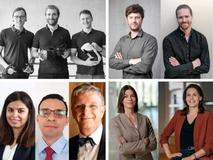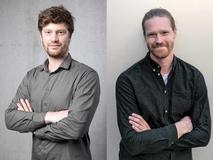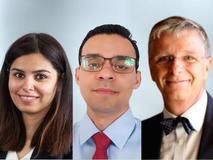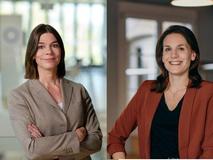Startups developing virtual reality for businesses, solutions for solid-state batteries, green and clean hydrogen production, and a solution for ‘Blended Psychotherapy’ each win CHF 10,000
22.06.2022
AtlasVR, eightinks, Reactive Illumination, and YLAH win Venture Kick's first stage of entrepreneurial and financial support. Their projects revolutionize training procedures by harnessing the potential of virtual reality (VR) technology; enable low production costs for solid-state lithium-ion batteries; propose an innovative green way to convert the biowaste to only solid carbon and energy-efficient gases like H2, CH4, and others within seconds without any chemicals that can be collected and used; and enable the continuation of therapy between sessions with an interactive web and mobile application for therapists and patients.
 |
 AtlasVR Co-Founders from left to right Valentin Holzwarth Christian Hirt, and Joy Gisler
|
 eightinks CEO Paul Baade and CBO Leon Baade
|
 Reactive Illumination Co-Founders Dr. Bhawna Nagar, Dr. Wanderson Oliveira de Silva, and Dr. Prof. Hubert Girault
|
 YLAH Founders: Business Shaper, Communications Cordelia Trümpy, and Product Development, Scientific Validation Florence Olivia von Gunten
|
AtlasVR: Virtual Reality for business
Traditional vocational training procedures – particularly in heavy machinery and special equipment – are characterized by numerous challenges: They are costly, language- and location-dependent, potentially harmful for trainees, and damaging to the equipment while disregarding the individual learning curves of trainees. Combined with the current skills shortage and the ongoing COVID pandemic, these challenges have fueled the demand for a skilled industrial workforce and on-demand access to vocational training solutions.
AtlasVR AG, a spin-off of ETH Zurich, revolutionizes training procedures by harnessing the potential of virtual reality (VR) technology. The founding team consists of Christian Hirt, Joy Gisler, and Dr. Valentin Holzwarth. Their VR training solutions enable active learning with an intuitive learning-by-doing approach, with no real machine required. By these means, the workforce can train independently of the respective machine tool, wherever and whenever. This saves substantial costs compared to real-world training while increasing trainee motivation and engagement. Entirely focused on a B2B model, specifically in the machine tool industry, AtlasVR AG offers a true end-to-end solution. They accompany their customers from initial contact with the technology via implementation to on-site rollout with options for service maintenance long after deployment.
The Venture Kick funding will be used to develop the AtlasCreator software platform towards the product stage and its market release, and also for business development activities, such as participation in trade fairs, and the development of a demo setup that can be shown to customers in person, but also remotely in case of COVID restrictions. atlasvr.ch
eightinks: solutions for solid-state batteries
State-of-the-art lithium-ion batteries face many challenges. They are heavy, bulky, and expensive. Also, they face safety issues and suffer from long charging times. The next-generation technology is solid-state batteries. Solid electrolytes are rigid lithium-ion conductors with a multitude of upsides: These types of batteries are lighter, smaller, and non-flammable. The technology has already seen billions of investments and prototypes are able to outperform standard batteries. However, widespread adoption is hindered by the lack of a suitable manufacturing technology. When switching from a liquid electrolyte (state of the art) to a solid electrolyte (next-gen) there must not be new production bottlenecks in order to keep costs low.
eightinks' solution is designed for the giga-scale by delivering high throughputs and simplifying the cell manufacturing process. The project is led by Dr. Paul Baade, a Pioneer Fellow at ETH Zürich, affiliated with the Materials and Device Engineering Group at D-ITET, Leon Baade is responsible for the business development and Prof. Vanessa Wood serves as the scientific advisor. Their patented manufacturing technology is compatible with existing equipment and enables low production costs. By keeping scalability and recyclability in mind eightinks strives to produce the best solid-state batteries. According to Statista, the global lithium-ion battery market was valued at around USD 40.5 billion in 2020. With the rapid growth of electric vehicles sales, the demand for lithium-ion batteries is skyrocketing as well and the market is expected to reach close to USD 200 billion by 2030. By then over 85% of the lithium-ion battery demand is coming from E-mobility solutions. They can observe great efforts from European car manufacturers to establish a battery supply chain within Europe. Therefore, they have a clear long-term focus on the automotive industry which benefits greatly from increased battery performance.
The venture kick funding will be used to demonstrate their technology in commercially relevant devices (pouch cells). Therefore, they need to purchase the necessary lab equipment to build these cell formats. Secondly, they aim to purchase a specific patent report on solid-state batteries. eightinks.com
Reactive Illumination: green and clean hydrogen production
Pyrolysis and other waste-to-energy conversion techniques used currently use non-renewable resources for heat production, emit large amounts of greenhouse gasses, take long hours and mainly produce oils that need several chemical treatment steps for their commercial uses.
Reactive Illumination proposes an innovative green way to convert any organic waste (biowaste, tyres etc.) to mainly solid carbon and energy-efficient gases like H2, CH4, etc. within seconds without any chemicals that can be collected and used. The three co-founders are Dr. Bhawna Nagar working at EPFL as a post-doc on electrode fabrication, device development, and materials synthesis for hydrogen production., Dr. Wanderson Oliveira de Silva, and Dr. Prof. Hubert Girault. At Laboratoire d'Electrochimie Physique et Analytique (LEPA), EPFL, the team successfully produced hydrogen and other energy-efficient gases using flashlight technology from waste biomass without significant production of CO2, that too, within 1-2 seconds. They now plan to extend this technology to a semi-industrial scale by building a demonstrator where large amounts of organic waste can be treated at once (50-100 Kg/day) which would produce approximately 5000-8000 L of Hydrogen per day in the first stage. The success of this demonstrator will narrate the opening of a biomass treatment site for the large-scale production of hydrogen in Switzerland. Not just this, other end product i.e. the conductive (bio)char has full potential to find their application in the billion-dollar carbon black market.
They plan to use the Venture Kick funds for the next 3- 12 months to include a formulation concept, a feasibility study, and the design, development, verification, and validation of the process for conversion of at least 50 kg biomass per day. Therefore, these phases will mainly include R&D work on the prototype setup, prototype evaluation, risk management, and validation preparation steps for the product launch.
YLAH: unlocking the full potential of psychotherapy
Every 2nd person suffers from a mental health issue in their lifetime. Every 3rd person in Europe is affected within a year. Healing takes 3 times longer than other physical health issues. Access to psychotherapists is limited and beyond the little time spent in sessions, there is no support in patients’ daily lives. Most patients don’t have a very active role in the therapy process and lack self-efficient disease management tools. Clinical tools are desperately sought by various stakeholders since they promise better results in a fast recovery. Our society is facing a growing number of mental health challenges. It is time to act now, bringing all parties together. Seamless care, always keeping that human touch.
YLAH is working on digital therapy (Digital Therapeutic DTx, Medical Device Software) in the field of psychotherapy. A team gathered around Florence von Gunten and Cordelia Trümpy is putting into practice a clinically validated approach, the "Blended Psychotherapy". YLAH combines in-person consultations with personalized digital interventions between each session. In the future, the entire journey for patients and therapists should be easier, more efficient, and more sustainable. YLAH brings a blended therapy approach into clinical practice and aligns face-to-face therapy with a web (therapist) and mobile (patient) application. Therapy activities can be automated and outsourced such as clinical assessments, health monitoring, and therapeutic exercises. The patient proactively engages with the treatment between sessions and the therapist gains feedback and data-based report about symptom- and process development serving tailored control and lowering admin burden also in interprofessional exchange. Overall, leading to proven effectiveness and efficiency gains in therapy.
The team plans to use the Venture Kick funds to to further develop their MVP and increase market traction. ylah.ch
Traditional vocational training procedures – particularly in heavy machinery and special equipment – are characterized by numerous challenges: They are costly, language- and location-dependent, potentially harmful for trainees, and damaging to the equipment while disregarding the individual learning curves of trainees. Combined with the current skills shortage and the ongoing COVID pandemic, these challenges have fueled the demand for a skilled industrial workforce and on-demand access to vocational training solutions.
AtlasVR AG, a spin-off of ETH Zurich, revolutionizes training procedures by harnessing the potential of virtual reality (VR) technology. The founding team consists of Christian Hirt, Joy Gisler, and Dr. Valentin Holzwarth. Their VR training solutions enable active learning with an intuitive learning-by-doing approach, with no real machine required. By these means, the workforce can train independently of the respective machine tool, wherever and whenever. This saves substantial costs compared to real-world training while increasing trainee motivation and engagement. Entirely focused on a B2B model, specifically in the machine tool industry, AtlasVR AG offers a true end-to-end solution. They accompany their customers from initial contact with the technology via implementation to on-site rollout with options for service maintenance long after deployment.
The Venture Kick funding will be used to develop the AtlasCreator software platform towards the product stage and its market release, and also for business development activities, such as participation in trade fairs, and the development of a demo setup that can be shown to customers in person, but also remotely in case of COVID restrictions. atlasvr.ch
eightinks: solutions for solid-state batteries
State-of-the-art lithium-ion batteries face many challenges. They are heavy, bulky, and expensive. Also, they face safety issues and suffer from long charging times. The next-generation technology is solid-state batteries. Solid electrolytes are rigid lithium-ion conductors with a multitude of upsides: These types of batteries are lighter, smaller, and non-flammable. The technology has already seen billions of investments and prototypes are able to outperform standard batteries. However, widespread adoption is hindered by the lack of a suitable manufacturing technology. When switching from a liquid electrolyte (state of the art) to a solid electrolyte (next-gen) there must not be new production bottlenecks in order to keep costs low.
eightinks' solution is designed for the giga-scale by delivering high throughputs and simplifying the cell manufacturing process. The project is led by Dr. Paul Baade, a Pioneer Fellow at ETH Zürich, affiliated with the Materials and Device Engineering Group at D-ITET, Leon Baade is responsible for the business development and Prof. Vanessa Wood serves as the scientific advisor. Their patented manufacturing technology is compatible with existing equipment and enables low production costs. By keeping scalability and recyclability in mind eightinks strives to produce the best solid-state batteries. According to Statista, the global lithium-ion battery market was valued at around USD 40.5 billion in 2020. With the rapid growth of electric vehicles sales, the demand for lithium-ion batteries is skyrocketing as well and the market is expected to reach close to USD 200 billion by 2030. By then over 85% of the lithium-ion battery demand is coming from E-mobility solutions. They can observe great efforts from European car manufacturers to establish a battery supply chain within Europe. Therefore, they have a clear long-term focus on the automotive industry which benefits greatly from increased battery performance.
The venture kick funding will be used to demonstrate their technology in commercially relevant devices (pouch cells). Therefore, they need to purchase the necessary lab equipment to build these cell formats. Secondly, they aim to purchase a specific patent report on solid-state batteries. eightinks.com
Reactive Illumination: green and clean hydrogen production
Pyrolysis and other waste-to-energy conversion techniques used currently use non-renewable resources for heat production, emit large amounts of greenhouse gasses, take long hours and mainly produce oils that need several chemical treatment steps for their commercial uses.
Reactive Illumination proposes an innovative green way to convert any organic waste (biowaste, tyres etc.) to mainly solid carbon and energy-efficient gases like H2, CH4, etc. within seconds without any chemicals that can be collected and used. The three co-founders are Dr. Bhawna Nagar working at EPFL as a post-doc on electrode fabrication, device development, and materials synthesis for hydrogen production., Dr. Wanderson Oliveira de Silva, and Dr. Prof. Hubert Girault. At Laboratoire d'Electrochimie Physique et Analytique (LEPA), EPFL, the team successfully produced hydrogen and other energy-efficient gases using flashlight technology from waste biomass without significant production of CO2, that too, within 1-2 seconds. They now plan to extend this technology to a semi-industrial scale by building a demonstrator where large amounts of organic waste can be treated at once (50-100 Kg/day) which would produce approximately 5000-8000 L of Hydrogen per day in the first stage. The success of this demonstrator will narrate the opening of a biomass treatment site for the large-scale production of hydrogen in Switzerland. Not just this, other end product i.e. the conductive (bio)char has full potential to find their application in the billion-dollar carbon black market.
They plan to use the Venture Kick funds for the next 3- 12 months to include a formulation concept, a feasibility study, and the design, development, verification, and validation of the process for conversion of at least 50 kg biomass per day. Therefore, these phases will mainly include R&D work on the prototype setup, prototype evaluation, risk management, and validation preparation steps for the product launch.
YLAH: unlocking the full potential of psychotherapy
Every 2nd person suffers from a mental health issue in their lifetime. Every 3rd person in Europe is affected within a year. Healing takes 3 times longer than other physical health issues. Access to psychotherapists is limited and beyond the little time spent in sessions, there is no support in patients’ daily lives. Most patients don’t have a very active role in the therapy process and lack self-efficient disease management tools. Clinical tools are desperately sought by various stakeholders since they promise better results in a fast recovery. Our society is facing a growing number of mental health challenges. It is time to act now, bringing all parties together. Seamless care, always keeping that human touch.
YLAH is working on digital therapy (Digital Therapeutic DTx, Medical Device Software) in the field of psychotherapy. A team gathered around Florence von Gunten and Cordelia Trümpy is putting into practice a clinically validated approach, the "Blended Psychotherapy". YLAH combines in-person consultations with personalized digital interventions between each session. In the future, the entire journey for patients and therapists should be easier, more efficient, and more sustainable. YLAH brings a blended therapy approach into clinical practice and aligns face-to-face therapy with a web (therapist) and mobile (patient) application. Therapy activities can be automated and outsourced such as clinical assessments, health monitoring, and therapeutic exercises. The patient proactively engages with the treatment between sessions and the therapist gains feedback and data-based report about symptom- and process development serving tailored control and lowering admin burden also in interprofessional exchange. Overall, leading to proven effectiveness and efficiency gains in therapy.
The team plans to use the Venture Kick funds to to further develop their MVP and increase market traction. ylah.ch


